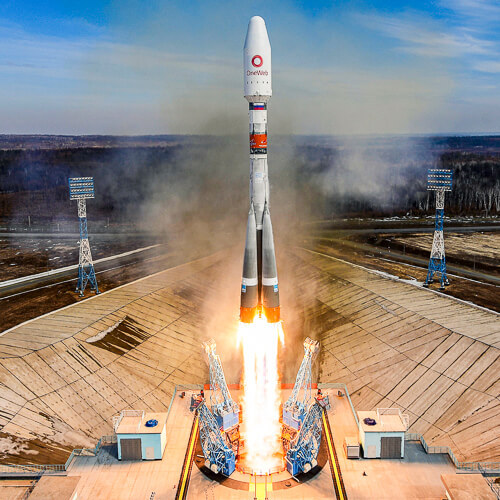
Also in today's EMEA regional roundup: Brazil bolsters Telefónica's Q3; Huawei's Hertz antenna platform pops up in Portugal; Virgin Media O2 on the recruitment trail.
OneWeb, the satellite connectivity company co-owned by the British government and India's Bharti Global, has signed a multi-year agreement with Paratus that will see the building of a satellite services gateway in Luanda, Angola. The gateway will provide low-Earth orbit (LEO) satellite services to several countries in the region, facilitating the supply of high-speed, low-latency connectivity to a range of organizations, such as businesses, government departments and schools. The Luanda project is the first of a number of planned OneWeb gateways in Africa. Paratus recently launched a fiber connection to the Democratic Republic of Congo and cut the ribbon on data centers in Zambia and Namibia. Figure 1:
 (Source: Roscosmos, Space-Center-Vostochny and TsENKi)
(Source: Roscosmos, Space-Center-Vostochny and TsENKi)Strong growth in Brazil and at its Telefónica Tech unit helped Telefónica push total revenue to €10.34 billion (US$10.12 billion) in the third quarter, a rise of 11.2% year on year. In Brazil, revenue was up 29%, dwarfing the operator's performance on its home turf of Spain, where revenue squeaked up by 0.2%. Overall third-quarter OIBDA (operating income before depreciation and amortization) was down 13% year-on-year, to €3.25 billion ($3.18 billion), though Telefónica attributes this largely to capital gains registered during the same period of 2021, which skew the figures. On the basis of these results, Telefónica confirms its financial targets for 2022, which were revised upwards in the previous quarter.
Huawei says FDD 8T8R antennas based on the vendor's Hertz platform have been deployed for the first time in Portugal. The Hertz platform uses technologies such as ultra-precision arrays to support precise beamforming and, claims Huawei, can greatly improve antenna energy efficiency.
Virgin Media O2 has created 125 new field engineer apprenticeships across the UK. No formal qualifications or prior experience is required, and Virgin says it will carry out "blind recruitment" to remove any potential bias from the recruitment process. Every apprentice who completes the 15-month training program is guaranteed a job in the company.
Abdurazak Mudesir has been appointed head of technology at Telekom Deutschland, succeeding Walter Goldenits, who is leaving the company at his own request. Mudesir's new role comes in addition to his international responsibilities as head of group technology at Telekom Deutschland's parent company, Deutsche Telekom. Mudesir has held various positions within the Deutsche Telekom group since 2018; before that he was with Huawei. Figure 2:
 Abdurazak Mudesir, Telekom Deutschland's new head of technology
Abdurazak Mudesir, Telekom Deutschland's new head of technology
(Source: Deutsche Telekom)Jersey-based Velos IoT has appointed two new senior staff members – Nicola Trudu as chief revenue officer and Frank Vernieuwe as chief technology officer. Velo IoT is backed by Perwyn, a private equity company.
Olivetti, the enterprise arm of Telecom Italia, has beefed up the female presence on its board with the appointment of five new women directors. The appointment of Giovanna Bellezza, Cristina Carollo, Maria Enrica Danese, Simona Girolamo and Carla Nisio means that the female presence on the board has risen from 14% to 60%.
— Paul Rainford, Assistant Editor, Europe, Light Reading
Read more about:
EuropeAbout the Author(s)
You May Also Like












